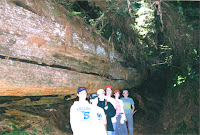Camping under the stars at national or state parks works best at primitive campsites. These are campsites with no electrical and water hook-ups or limited hook-up capabilities. At primitive national park camps there are flush toilets available, but not many. And you need a flashlight if you go at night. These bathrooms usually have sky lights, but that doesn’t help at night unless the moon is brilliantly full and you’re camping in the desert with no trees to block out the light.
You can still see millions of stars at camps with electrical hook-ups, though. What the children liked most was when they got to see a shooting star in the black of a moonless night. But there are many activities to do at night at national or state parks. In my “Night Prowls” post, I discussed ranger-led walks in the dark. And in my “Summertime Means Family Camping And Star-Gazing” post I talk about the Aurora Borealis we saw while camping in Newfoundland.
In this post, I’d like to discuss how night creatures navigate in the darkness. Hint: They listen to their surroundings, which is impossible to do with children because you’re too busy shushing them—even teenagers.
 |
| The mighty Sequoia trees do fall. But the huge beasts last forever even on the forest floor. |
We were in Sequoia and Kings Canyon National Parks and a naturalist took us out to the field to watch the stars pop out at night. But so did the night creatures. This time, only the adults were armed with flashlights to assist with night vision on this mile-long walk.
Our twins still didn’t like to venture into the darkness at night because we were deep in bear country. Yes, we saw lots of bear this trip to California. So I understood their apprehension. Consequently, I journeyed with only my two oldest daughters and my son. My husband stayed with the twins.
Now you’re thinking “less to shush,” right?
Wrong!
The older ones are the loud mouths. The twins just follow along.
The naturalist had us form a circle in the darkness of a field as she talked about the echolocation of bats. And while the symphony of bug noises grew, so too, did my children’s whispers. How could I hear the “chit” of a bat with my own batty-brained kids yammering in my ear?
“Guys—shush!” I whispered.
And, yes! Everyone heard me—except my children—even with the crescendo of bug symphony playing.
They “shushed” my “shush.”
I decided to watch the lightning bugs dress the sides of the forest trees surrounding the field. Their lighted bottoms made a pattern of lace against the dappled blackness of the leaves.
Then the naturalist proceeded to help us noisy humans listen better in the night by standing in the center of our circle and tossing a deflated beach ball to one or another of our group without warning.
Yep! She knew who the noisy ones were. She smacked my boy right in the kisser with the deflated ball. It didn’t hurt, only startled, but it got my kids to shut up.
Back and forth, the naturalist tossed the deflated ball to our group, and as the night progressed, so did our ability to catch it. Our group finally quieted down.
As we continued to look up at a black velvet sky studded with rhinestones, waiting, hoping to see a falling star, the naturalist informed us about the eyes of the night creatures and how the size of them are made to capture any light, any movement in the night. She told us that about 70% of animals are nocturnal. And that they’re sensitive to noise and light. That’s why we need to respect them. The National Park Service has a great website with information about the night sky here.
I glared at my children, even though they couldn’t see me in the darkness. The crystal clear night sky, the sounds of nature had finally awed them into silence. And that, ladies and gentlemen, is the reason to camp under the stars with your family.
Thanks for visiting my Camping with Kids blog. Please let me know in the comments section if you’ve ever seen the Arora Borealis, the colorful clouds that mute the stars at night, or a shooting star. Where did you see one? When you see a good shooting star, meaning one that lasts about 5 to 10 seconds, we think it looks like a long white cigarette with the lighted orange tip burning into the Earth’s atmosphere. Or do you just like to gaze up at a night sky to watch for satellites, which we call “calm moving stars” as the pinprick of light flies on its trajectory around the Earth. Happy star gazing, everyone!

Hi Victoria – what a great post … about how we need to be more aware of the disturbances we make at night – I know we are changing some animals habits. Clever lady using that deflated ball – it must have been really dark … just lying in the dark and listening … or sitting and watching the stars … or standing together – well done on getting us to read your words with their wisdom … thanks – cheers Hilary
Thank you so much for your kind words, Hilary. They always make my day. Yes, camping at primitive campsites sure cuts down on light pollution. If we could listen closely, we could hear the swish of the deflated ball coming our way. It was a great experience.
It's always a pleasure seeing you here at Camping with Five Kids, Hilary. Enjoy your week!
I love looking at the stars with the naked eye and through a telescope. One of these primitive campsites must be the best place to see them. We have too many lights around here to see well.
I would love to go to a national park and camp. Although I don't have kids, I love spending time in nature. I have been in remote area of Vermont where I have seen a lot of stars- but I imagine there are even more in other parts of the world. 🙂 Glad your kids finally quieted down and enjoyed the experience.
~Jess
We find the night sky beautiful, Michelle. We can spend hours just watching for a chance to see a shooting star. Rural places are best to see more stars because there is less light pollution. Try visiting a field or the beach or large lakes looking out over the water.
It’s always a pleasure seeing you here at Camping with Five Kids. Enjoy your day!
Vermont has a lot of beautiful countryside, Jess. We've taken the children there, too. But out west is where we've seen the most stars. We find spending time in nature very relaxing. We're away from all the rush-rush of life. It's a good thing for everyone.
Thanks so much for your comment, Jess. And thanks for visiting Camping with Five Kids. It's greatly appreciated. Enjoy your day!
The night sky fascinates me, the millions of stars, where does it end? Perhaps it doesn't. The best views of the night sky I have experienced were in my sailing days, out in the ocean with no light pollution.
I haven't seen the Aurora Borealis, although it is on my bucket list. The best place to see it in the UK is in northern Scotland, Orkney or the Shetlands but despite many visits it still eludes me.
I will probably end up booking a trip to Iceland where the odds on seeing the Northern Lights are more favourable.
Bill
http://walksintameside.co.uk
The sky must light up, Bill, out on the sea. Bravo to you for having that experience. Yes, we got lucky to see the Aurora Borealis in Newfoundland. But we only saw it once. The kids were mad because we didn't wake them to see it and it never happened the rest of the week. I understand that the Aurora Borealis shows itself only once in a while, so people are lucky if they catch it. So interesting that you've visited the "highlands" of Scotland. I bet you've had wonderful hikes/walks there. Wouldn't it be great to visit Iceland. The kids have asked. Not for 7, though. I hope you write about any adventures in Iceland, if you go.
It's always a pleasure seeing you here at Camping with Five Kids, Bill. Enjoy your week!